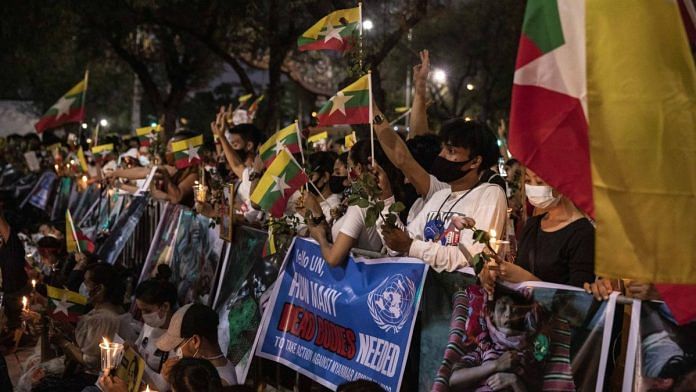New Delhi: A latest United Nations (UN) report has revealed that the military junta in Myanmar has imported roughly $1 billion worth of weapons from five countries — Russia, China, Singapore, India and Thailand — since it took over the country in a coup in February 2021.
According to the report, titled The Billion Dollar Death Trade, released by the Office of the UN High Commissioner for Human Rights (OHCHR) Wednesday, these imported weapons have been used to perpetrate atrocities and human rights violations against civilians.
The report finds that of the $1 billion worth of weapons traded, Russia contributed $406 million to the Myanmar military; China, $267 million; Singapore, $254 million; and India and Thailand, merely $51 million and $28 million, respectively.
The UN report documents over 12,500 purchases, of which 94 per cent, or $947 million, were conducted directly with the Myanmar military and 6 per cent, or $58 million, through Myanmar-based military suppliers or sanctioned arms dealers.
UN Special Rapporteur Tom Andrews said in a press statement, “International suppliers allow the Myanmar military unfettered access to arms used to commit horrific human rights violations,” noting that UN member states are “enabling this trade”.
Andrews further observed that despite “overwhelming evidence” against the Myanmar junta’s atrocious crimes, they continue to have access to advanced weapons.
The $1 billion of weapons supplied include $601 million worth of arms, $180 million worth of dual-use military supplies, $87 million of manufacturing equipment, $77 million raw materials and $61 million military infrastructure.
These consist of fighter jets, reconnaissance and attack drones, advanced missile systems, radar complexes and parts for small arms among others.
Also read: Manipur govt to build shelters for Myanmar nationals in India ‘on humanitarian considerations’
Who are the suppliers?
While the major suppliers are Russia, China and Singapore, with India and Thailand contributing a relatively lesser amount, the report identifies 254 unique suppliers within these countries.
Russia, the top supplier to the military, had 28 unique suppliers based in the country, which shipped a range of materials. This includes fighter jets such as the SU-30, MiG-29 and Yak-130, among others, Schiebel S100 reconnaissance and light attack drone, GAZ-66 light military utility trucks and more.
These Russian weapons, based on the UN report, have been used to commit “probable war crimes and crimes against humanity in Myanmar”, with the Mi-35 helicopter most sighted in strikes against schools and hospitals.
Citing an example, the report states, “Specific recent examples of military air strikes using Russian arms include an hour-long attack of a school and monastery on 16 September, 2022, in which at least six children were killed in Let Yet Kone Village and Tabayin Township in the Sagaing Region. The ground attack was led by Mi-17 helicopters, followed by airstrikes by two Mi-35 helicopters”.
Similarly, 41 Chinese suppliers shipped weapons, such as FTC-2000G multirole advanced jet, spare parts for various helicopters, fighter and transport jets, radio and communication equipment, marine equipment, diesel generating systems and more. Chinese K-8 jet fighters, according to the report, were most frequently spotted in attacks.
While in Russia, China and India, these entities include state-owned or-operated companies, the UN report observes that is not the case for Singapore and Thailand.
“The Special Rapporteur has received no information indicating that entities owned or controlled by the Governments of Singapore or Thailand, or the governments themselves, have approved or transferred arms to the Myanmar military,” the report stated.
However, in India, both state-owned and private entities have been trading shipping material such as a coastal surveillance system, a remote-controlled weapons system, 122 mm howitzer barrels, explosive fuses likely for artillery shells, and more with the junta.
A total of 22 Indian entities have been supplying materials used in surveillance, artillery, and missiles — all manufactured by state-owned entities — to the junta. The report notes that these sales violate the country’s obligations under international humanitarian law as well as the Wassenaar Arrangement.
The Wassenaar Arrangement on Export Controls for Conventional Arms and Dual-Use Goods and Technologies is a multilateral export control agreement between 42 countries, including India, Russia, US and UK among others, promoting transparency among member states through regular exchange of information on trade of conventional arms and dual-use goods and technologies.
Singapore, with the highest number of suppliers — 138 — ships material such as components and spare parts for jets and helicopters such as MiG-29, K-8W, Mi-17, radio, radar and communication equipment and more to the military. These suppliers are crucial in the operations of Myanmar’s KaPaSa weapons factories.
Thailand, with 12 suppliers, mostly shipped spare parts, raw materials and construction and communications equipment.
Failure of sanctions
Since the coup, numerous UN member states have imposed sanctions on the Myanmar junta instead of an arms embargo by the United Nations Security Council (UNSC). This is because Russia and China — top suppliers to the junta and permanent members of the UNSC — make it impossible to impose a comprehensive arms embargo on the military.
Despite sanctions, the Myanmar military continues to receive large quantities of arms and other materials through UN member states.
“The Myanmar military and its arms dealers have figured out how to game the system,” said Andrews. “That’s because sanctions are not being adequately enforced and because arms dealers linked to the junta have been able to create shell companies to avoid them.”
The report recommends sanctions on numerous Myanmar entities such as Myanmar Oil and Gas Enterprise and Myanmar Foreign Trade Bank, among others; and economic sanctions on the military, among others.
(Edited by Zinnia Ray Chaudhuri)
Also read: India is ignoring the escalating war in Myanmar that could reignite conflicts in Northeast



